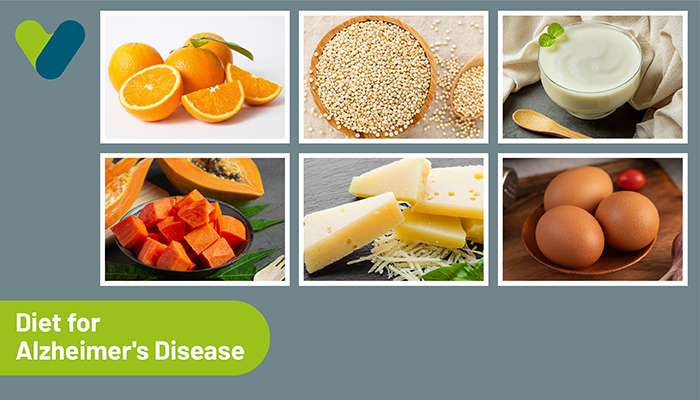Alzheimer's disease is a neurodegenerative disorder that causes atrophy, commonly known as brain shrinkage. Abnormal build-up of proteins forms plaques around the brain cells. This causes the brain cells to degenerate and eventually fade or die. Dementia is the most common symptom of Alzheimer's disease. As the disease progresses, individuals with Alzheimer's disease develop severe memory loss. They also exhibit symptoms like disorientation, mood swings and behavioural issues. Individuals with Alzheimer's diseases often lose their appetite. They find normal activities like chewing and swallowing difficult. Depression, tiredness and medication may also lead to appetite changes. Poor nutrition can cause weight loss and also amplify behavioural symptoms. This is why doctors recommend patients diagnosed with this ailment to follow a strict Alzheimer's diet.
Foods to Eat During Alzheimer’s Disease
Like any good diet that helps an illness from aggravating, an Alzheimer's diet also comprises nutrients-rich foods to keep the patient healthy and relieve some symptoms.- Fruits and Vegetables: Fruits and vegetables are packed with antioxidants. Vitamin C is a potent antioxidant that supports brain health as you age. Oranges, papaya, lemons, etc., are top vitamin C sources. Additionally, cruciferous vegetables like broccoli, cauliflower, mustard greens, etc., are rich in B vitamins and carotenoids. They reduce the level of homocysteine, a protein linked to brain atrophy.
- Whole Grains: Whole grains are highly fibrous. They make stools bulkier and reduce the risk of constipation. They are also packed with vitamins, minerals, protein and antioxidants. Doctors consider whole grains as important foods for dementia prevention. The Mediterranean-DASH Intervention for Neurodegenerative Delay (MIND) diet states that you can cut your Alzheimer's risk by consuming at least three servings of whole grains daily.
- Dairy Products: Dairy products are important foods for Alzheimer's disease. Milk and dairy are high in calcium, and necessary for bone and dental health. They are also rich in potassium, protein, phosphorous, riboflavin and pantothenic acid. Dairy products help reduce tiredness and fatigue. Individuals with Alzheimer's disease may find it easier to ingest low-fat milk, yoghurt, cheese, etc.
- Lean Protein: Protein is crucial for boosting immunity. The amino acids in the protein help in the development of white blood cells and their associated antibodies. Due to changes in dietary patterns, patients with Alzheimer's disease are at a greater risk of developing certain infections. Such individuals should consume lean protein like white chicken meat or eggs, as it is easier to digest.
Foods to Avoid During Alzheimer’s Disease
Foods that can aggravate health conditions are not ideal for individuals suffering from Alzheimer's. They are as follows:- Saturated Fats: Saturated fats are responsible for cholesterol production in the body. Cholesterol causes build-up in the arteries of the heart. This may result in reduced oxygenated blood supply to the brain.
- Refined Sugars: Refined sugars are usually found in processed foods, and they lack in essential nutrients. Fruits, fruit juices, fruit-sweeteners can substitute refined sugar and encourage eating.
- High Sodium: Sodium in salt affects blood pressure. High sodium in foods make them tasty but can cause hypertension. Foods for Alzheimer's disease prevention must contain less salt and more herbs and spices.
Ways To Build Appetite In Patients With Alzheimer's Disease
Behavioural issues can make an individual with dementia lose interest in food. Here are tips to encourage such individuals to eat more:- Limit Distractions While Eating: Individuals with dementia can lose focus easily. Serve meals in quieter surroundings, preferably away from the television. Prepare Easy-To-Chew Foods Difficulty swallowing can lead to choking. Cut fruits and vegetables into bite-sized pieces. Serves soft foods that require minimal chewing effort, such as porridge, soups, dals, curries, etc.
- Serve One Food Item At A Time: A person living with Alzheimer's disease may get overwhelmed with large food quantities and refuse eating. Consider offering one or two food items at a time.
- Keep Mealtimes Social: Eating with other family members can also encourage the individual to eat more.
- Use Simple Serve-Wares: Serve food in utensils that are easier to handle. People with Alzheimer's disease may gradually lose cognitive and motor functions. Replace plates and forks with bowls and spoons.
- Allow Plenty Of Time: Do not rush the individual into eating their meals faster. Since their mobility is hindered, they may require an hour or more to finish simple meals.
